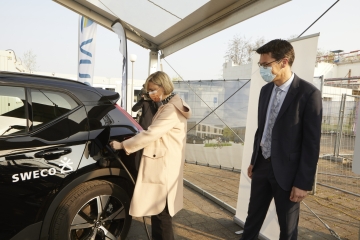First 'smart charging station' supplies office with energy from car batteries

In Zelzate, Belgium's first charging station was opened at an office of engineering firm Sweco. Electric cars are used there to store solar energy so that it can be used elsewhere or during dark periods.
In Zelzate, Belgium's first charging station was opened at an office of engineering firm Sweco. Electric cars are used there to store solar energy so that it can be used elsewhere or during dark periods.
In Zelzate, Belgium's first charging station was opened at an office of engineering firm Sweco. Electric cars are used there to store solar energy so that it can be used elsewhere or during dark periods.
The charging station consists of a series of smart charging stations that engage an entire fleet of cars to store solar energy en masse. Sweco is a pioneer with a fleet that will soon include 200 electric vehicles, good for a storage capacity of 1 MW, comparable to a small power plant. It is an expensive investment, but one that can also be earned back through fluctuating energy prices, and which in the meantime relieves the burden on the grid.
Minister of Finance Vincent Van Peteghem (CD&V) already indicated that by 2026 only the electric company car will be fiscally advantageous. Flemish Vice Minister Hilde Crevits, for her part, provided subsidies for the innovative pilot project. In the future, charging plazas can play an important role in relieving the energy grid, which now often suffers from a power surplus during sunny weather.
The technology can also provide a financial benefit for users with an electric car, especially if they generate their own power with solar panels. By injecting it when the price of electricity is high or storing it when it is cheap, the investment can also pay for itself in the long term.
The Sweco office in Zelzate, which is still under construction for the time being, will be able to run on an entirely energy-neutral basis with the new infrastructure.
Latest insights & stories

ROAD SAFETY
Since 2018, the number of traffic casualties in Flanders has risen again. Currently, the figures are stagnating, but the risk of accidents with injuries remains high for vulnerable road users in Flanders. And that while traffic should be safe for all users and modes. We want to change this by focusing on transparent policy, training on safe behavior, infrastructure improvements, legislation and enforcement.

What is needed for a more circular construction sector? Insights from Sien Cornillie, Circularity expert at NAV
NAV, or "Netwerk Architecten Vlaanderen," is a professional organisation for architects in Flanders. It offers various services including professional development and advocacy for the architectural sector. NAV also fosters networking opportunities and provides advice on legal, technical, and management aspects. The network is currently working on a position paper on circularity. We sat down with Sien Cornillie, an expert on circularity and energy at NAV. This interview reflects her own opinion.

A Global Movement: The World Unites in a Pink Pledge for Clean and Sustainable Water
5,000 participants. 32 countries. €30,000 funds raised. And that's just the beginning.
Picture this: One step that sends ripples across the globe, transforming lives and creating waves of change. You might wonder, how can such a simple action for most of us have such a profound impact?